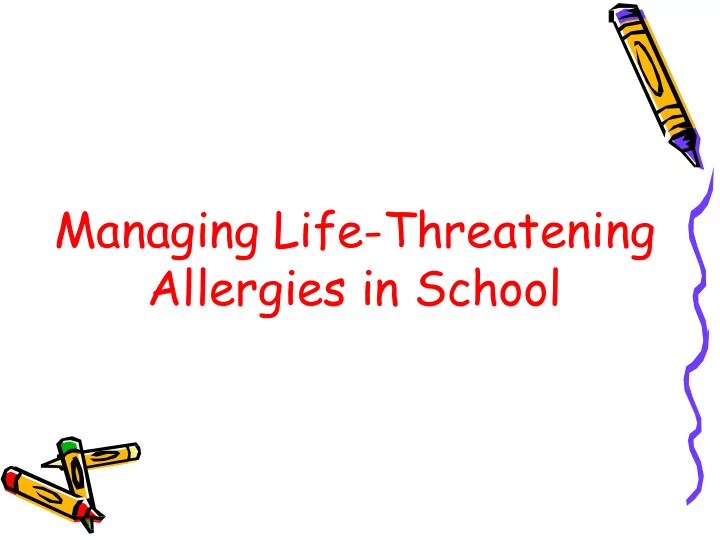

Managing Life - Threatening Allergies in School
Allergy Basics • The role of the immune system is to protect the body from germs and disease • An allergic reaction is an abnormal response of the immune system to contact with a substance (the allergen) • When an allergen (food, bee sting, etc.) is encountered, the immune system reacts as if the substance is harmful and releases histamine and other chemicals to “att a ck” t he enemy
Allergy Facts • Food allergies affect about 2 million children • 25% of food reactions are first-time reactions • Most food reactions occur from classroom food used in projects or for parties • Allergens can be in non-food items: soaps, shampoos, bee stings, medications, pet foods and bedding, or latex • There is no way to predict the severity of an allergic reaction • All allergic reactions must be taken seriously
Symptoms of a Lif e-Threate ning Allerg y • Symptoms may appear within seconds following or even hours after the exposure to the allergen • You may see some or all of the following: – Tingling sensation in the mouth – Swelling of the lips, tongue and throat – Difficulty breathing – Hives – Vomiting, diarrhea, abdominal cramps – Loss of consciousness
If a Reaction Occurs: Recognize, React, Review Immediately Activate the Emergency Action Plan in the Student’s IHP! • Recognize the symptoms • React quickly. Immediately call the nurse or trained delegate to administer the stu dent’s epinephrine/ emergency medication; When calling, state the name of the student, what the emergency is, and the stud ent’s location • Review what caused the reaction and how well the emergency plan worked
Be Prepared for an Allergic Reaction • Be familiar with the studen t’s Individuali zed Healthcare Plan (what they are allergic to, the signs and symptoms of a reaction, and what to do) • Emergency medications must be immediately available at all times • Know location of medication and who to contact to administer them (on IHP). • Teache r’s “sub pla n s” to include this info
Strategies to Minimize Risk of Reactions • Clean hands and eating surfaces before and after eating or handling food • Create “s afe eating zon e” for the student • Alert classma te’s parents that a student in the class has a severe allergy without naming the student • Plan for safe parties or school celebrations; notify parents of affected children in advance in order to provide safe choices and alternatives • Avoid using food or allergen in the classroom art/craft project, or as an incentive • Prohibit food sharing and trading
Vigilant Label Reading • Read every label every time – Formulations change without warning • Do not rely on “sa fe lists ” found on web
Careful Food Handling/ Preparation • Wash hands, cooking utensils, and food eating/preparation surfaces to avoid reactions from trace amounts of proteins • Use liquid soap, bar soap, or commercial wipes for hands, NOT antibacterial sanitizers • Use dishwashing detergent and hot water for cooking utensils and cutting boards • Use common household cleaners for counters, tables, desks and other surfaces
Epinephrine Auto- inje ctors (Student’s Emergency Medication) • Auto-injectors (Epi-Pen, Twinject) are designed to use quickly and easily • Each auto-injector is stored in a plastic container that protects against UV light • Auto-injectors should be stored at room temperature in a dark place and be readily accessible in an emergency • The school nurse and designated delegate may administer it, as well as the student (if authorized to sel f - administer)
School’s Responsibility • Create an environment where children with allergies will be safe • Employ prevention and avoidance strategies • Address teasing and protect confidentiality • Practice the Life-threatening Allergy Plan before a reaction occurs • Ensure that the transportation department is involved in ch ild’s plan (if taking a school bus) • Plan for field trips • Ensure that a properly trained person is always available for child in case of a reaction (emergency administration of epinephrine via auto-injector)
Family’s Responsibility • Provide written medical documentation • Work with the school to develop a plan • Provide properly labeled medications and replace after use or when expired • Keep emergency contact information current • Teach the child age-appropriate self- management skills
Student’s Responsibility • Should not trade food with others • Should not eat anything with unknown ingredients or known to contain an allergen • Should notify an adult immediately if they suspect an allergen has been ingested, or that they have been exposed to an allergen
What to Do • Read the stu dent’s Emerge ncy Action Plan in IHP • Call the school nurse • When in doubt and the nurse is unavailable, call 911
•This informa tion and more can be located at www.foodallergy.org (the Food Allergy Network) or ask your School Nurse
Recommend
More recommend